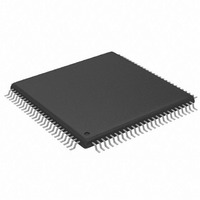PIC24FJ256GB110-I/PF Microchip Technology, PIC24FJ256GB110-I/PF Datasheet - Page 136

PIC24FJ256GB110-I/PF
Manufacturer Part Number
PIC24FJ256GB110-I/PF
Description
IC PIC MCU FLASH 256K 100TQFP
Manufacturer
Microchip Technology
Series
PIC® 24Fr
Datasheets
1.PIC24FJ128GA106-IPT.pdf
(52 pages)
2.PIC24FJ64GB106-IPT.pdf
(16 pages)
3.PIC24FJ64GB106-IPT.pdf
(352 pages)
4.PIC24FJ192GB108-IPT.pdf
(328 pages)
Specifications of PIC24FJ256GB110-I/PF
Program Memory Type
FLASH
Program Memory Size
256KB (85.5K x 24)
Package / Case
100-TQFP, 100-VQFP
Core Processor
PIC
Core Size
16-Bit
Speed
32MHz
Connectivity
I²C, SPI, UART/USART, USB OTG
Peripherals
Brown-out Detect/Reset, LVD, POR, PWM, WDT
Number Of I /o
83
Ram Size
16K x 8
Voltage - Supply (vcc/vdd)
2 V ~ 3.6 V
Data Converters
A/D 16x10b
Oscillator Type
Internal
Operating Temperature
-40°C ~ 85°C
Processor Series
PIC24FJ
Core
PIC
Data Bus Width
16 bit
Data Ram Size
16 KB
Interface Type
I2C/SPI/UART
Maximum Clock Frequency
32 MHz
Number Of Programmable I/os
84
Number Of Timers
5
Maximum Operating Temperature
+ 85 C
Mounting Style
SMD/SMT
3rd Party Development Tools
52713-733, 52714-737, 53276-922, EWDSPIC
Development Tools By Supplier
PG164130, DV164035, DV244005, DV164005, PG164120, DM240001, DM240011
Minimum Operating Temperature
- 40 C
On-chip Adc
16-ch x 10-bit
Lead Free Status / RoHS Status
Lead free / RoHS Compliant
For Use With
876-1004 - PIC24 BREAKOUT BOARDDM240001 - BOARD DEMO PIC24/DSPIC33/PIC32
Eeprom Size
-
Lead Free Status / Rohs Status
Lead free / RoHS Compliant
Available stocks
Company
Part Number
Manufacturer
Quantity
Price
Company:
Part Number:
PIC24FJ256GB110-I/PF
Manufacturer:
MICROCHIP
Quantity:
21 000
Company:
Part Number:
PIC24FJ256GB110-I/PF
Manufacturer:
MICROCHIP
Quantity:
214
Company:
Part Number:
PIC24FJ256GB110-I/PF
Manufacturer:
Microchip Technology
Quantity:
10 000
- PIC24FJ128GA106-IPT PDF datasheet
- PIC24FJ64GB106-IPT PDF datasheet #2
- PIC24FJ64GB106-IPT PDF datasheet #3
- PIC24FJ192GB108-IPT PDF datasheet #4
- Current page: 136 of 352
- Download datasheet (3Mb)
PIC24FJ256GB110 FAMILY
10.4.2
The peripherals managed by the Peripheral Pin Select
are all digital only peripherals. These include general
serial communications (UART and SPI), general pur-
pose timer clock inputs, timer related peripherals (input
capture and output compare) and external interrupt
inputs. Also included are the outputs of the comparator
module, since these are discrete digital signals.
Peripheral Pin Select is not available for I
notification inputs, RTCC alarm outputs or peripherals
with analog inputs.
A key difference between pin select and non pin select
peripherals is that pin select peripherals are not asso-
ciated with a default I/O pin. The peripheral must
always be assigned to a specific I/O pin before it can be
used. In contrast, non pin select peripherals are always
available on a default pin, assuming that the peripheral
is active and not conflicting with another peripheral.
10.4.2.1
Pin-selectable peripheral outputs (e.g., OC, UART
Transmit) take priority over general purpose digital
functions on a pin, such as PMP and port I/O. Special-
ized digital outputs, such as USB functionality, will take
priority over PPS outputs on the same pin. The pin
diagrams provided at the beginning of this data sheet
list peripheral outputs in the order of priority. Refer to
them for priority concerns on a particular pin.
Unlike
pin-selectable peripheral inputs never take ownership
of a pin. The pin’s output buffer is controlled by the
TRISx setting or by a fixed peripheral on the pin. If the
pin is configured in Digital mode, the PPS input will
operate correctly. If an analog function is enabled on
the pin, the PPS input will be disabled.
DS39897C-page 136
PIC24F
AVAILABLE PERIPHERALS
Peripheral Pin Select Function
Priority
devices
with
fixed
2
C™ change
peripherals,
10.4.3
Peripheral Pin Select features are controlled through
two sets of Special Function Registers: one to map
peripheral inputs and one to map outputs. Because
they are separately controlled, a particular peripheral’s
input and output (if the peripheral has both) can be
placed on any selectable function pin without
constraint.
The
peripheral-selectable pin is handled in two different
ways, depending on if an input or an output is being
mapped.
10.4.3.1
The inputs of the Peripheral Pin Select options are
mapped on the basis of the peripheral; that is, a control
register associated with a peripheral dictates which pin
it will be mapped to. The RPINRx registers are used to
configure peripheral input mapping (see Register 10-1
through Register 10-21). Each register contains two
sets of 6-bit fields, with each set associated with one of
the pin-selectable peripherals. Programming a given
peripheral’s bit field with an appropriate 6-bit value
maps the RPn pin with that value to that peripheral. For
any given device, the valid range of values for any of
the bit fields corresponds to the maximum number of
peripheral pin selections supported by the device.
10.4.3.2
In contrast to inputs, the outputs of the Peripheral Pin
Select options are mapped on the basis of the pin. In
this case, a control register associated with a particular
pin dictates the peripheral output to be mapped. The
RPORx registers are used to control output mapping.
Each register contains two 6-bit fields, with each field
being associated with one RPn pin (see Register 10-22
through Register 10-37). The value of the bit field
corresponds to one of the peripherals and that
peripheral’s output is mapped to the pin (see
Table 10-3).
Because of the mapping technique, the list of peripher-
als for output mapping also includes a null value of
‘000000’. This permits any given pin to remain discon-
nected from the output of any of the pin-selectable
peripherals.
association
CONTROLLING PERIPHERAL PIN
SELECT
Input Mapping
Output Mapping
of
2009 Microchip Technology Inc.
a
peripheral
to
a
Related parts for PIC24FJ256GB110-I/PF
Image
Part Number
Description
Manufacturer
Datasheet
Request
R

Part Number:
Description:
Manufacturer:
Microchip Technology Inc.
Datasheet:

Part Number:
Description:
Manufacturer:
Microchip Technology Inc.
Datasheet:

Part Number:
Description:
Manufacturer:
Microchip Technology Inc.
Datasheet:

Part Number:
Description:
Manufacturer:
Microchip Technology Inc.
Datasheet:

Part Number:
Description:
Manufacturer:
Microchip Technology Inc.
Datasheet:

Part Number:
Description:
Manufacturer:
Microchip Technology Inc.
Datasheet:

Part Number:
Description:
Manufacturer:
Microchip Technology Inc.
Datasheet:

Part Number:
Description:
Manufacturer:
Microchip Technology Inc.
Datasheet:











